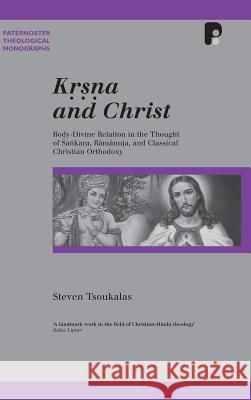Krsna and Christ » książka
Krsna and Christ
ISBN-13: 9781498249522 / Angielski / Twarda / 2011 / 328 str.
Krsna and Christ
ISBN-13: 9781498249522 / Angielski / Twarda / 2011 / 328 str.
(netto: 260,64 VAT: 5%)
Najniższa cena z 30 dni: 269,89
ok. 16-18 dni roboczych.
Darmowa dostawa!
This work compares the Krsnavatara (Krsna in his avatara doctrines of Sankara and Ramanuja and the incarnation of Christ as represented by classical Christian orthodoxy, and draws out comparative theological and soteriological implications. It does so first by examining the epistemologies, theologies and world views of Sankara and Ramanuja, and the theology and world view of classical Christian orthodoxy, so that, second, an adequate foundation and subsequent thorough representation of avatara and incarnation might be accomplished, in order that, third, accurate comparisons may be drawn between avatara and incarnation. The result of this study is a demonstration that many of the popularly held similarities between avatara and incarnation are superficial, and that therefore careful consideration of epistemologies and ontologies should be undertaken when comparing theologies and soteriologies pertinent to avatara and incarnation. --This is a learned, nuanced, and penetrating work of scholarship which succeeds in demonstrating the theological differences between the Christian concept of Incarnation and that of the Krishna avatara in classical Vedanta, but at the same time indicates the rich possibilities for dialogue between the two traditions. A landmark work in the field of Christian-Hindu theology.-- Julius Lipner, Professor of Hinduism and the Comparative Study of Religion, University of Cambridge --This volume is a penetrating exploration of crucial differences between Christianity's incarnation of Christ and certain Hindu traditions' doctrines of Krishna avatara. Dr. Tsoukalas's study lays out strong epistemological and doctrinal foundations, and well-documented conclusions for those who desire to take the discussion beyond comparative issues into the more strongly contested arena of conflicting truth claims. Christians and Hindus alike will find it an invaluable resource for helping them understand common concerns as well as what is at stake in the profound differences between avatar and incarnation.-- Jerry L. Walls, Professor of Philosophy of Religion, Asbury Theological Seminary --There are quite a few books available today that seek to --compare-- religions. However, there are not many that have done it quite as well as Tsoukalas has in this excellent text. Tsoukalas is not just content with hasty assimilations but instead provides an expert, detailed and lucid analysis of the textual and philosophical background to Hindu notions of avatara and Christian concepts of incarnation. The result is an important and significant contribution to scholarship--not only in Hindu-Christian comparative studies but also to comparative literature generally.-- David Cheetham, Director, Centre for the Study of Christianity and South Asian Studies, Department of Theology and Religion, University of Birmingham Steven Tsoukalas holds a PhD in theology from the University of Birmingham, a ThM in world religions (specializing in Hindu studies) from Harvard University, and an MDiv from from Gordon-Conwell Seminary. He is the author of several books and articles and has taught courses in world religions, theology, biblical studies, cults, and new religious movements.











